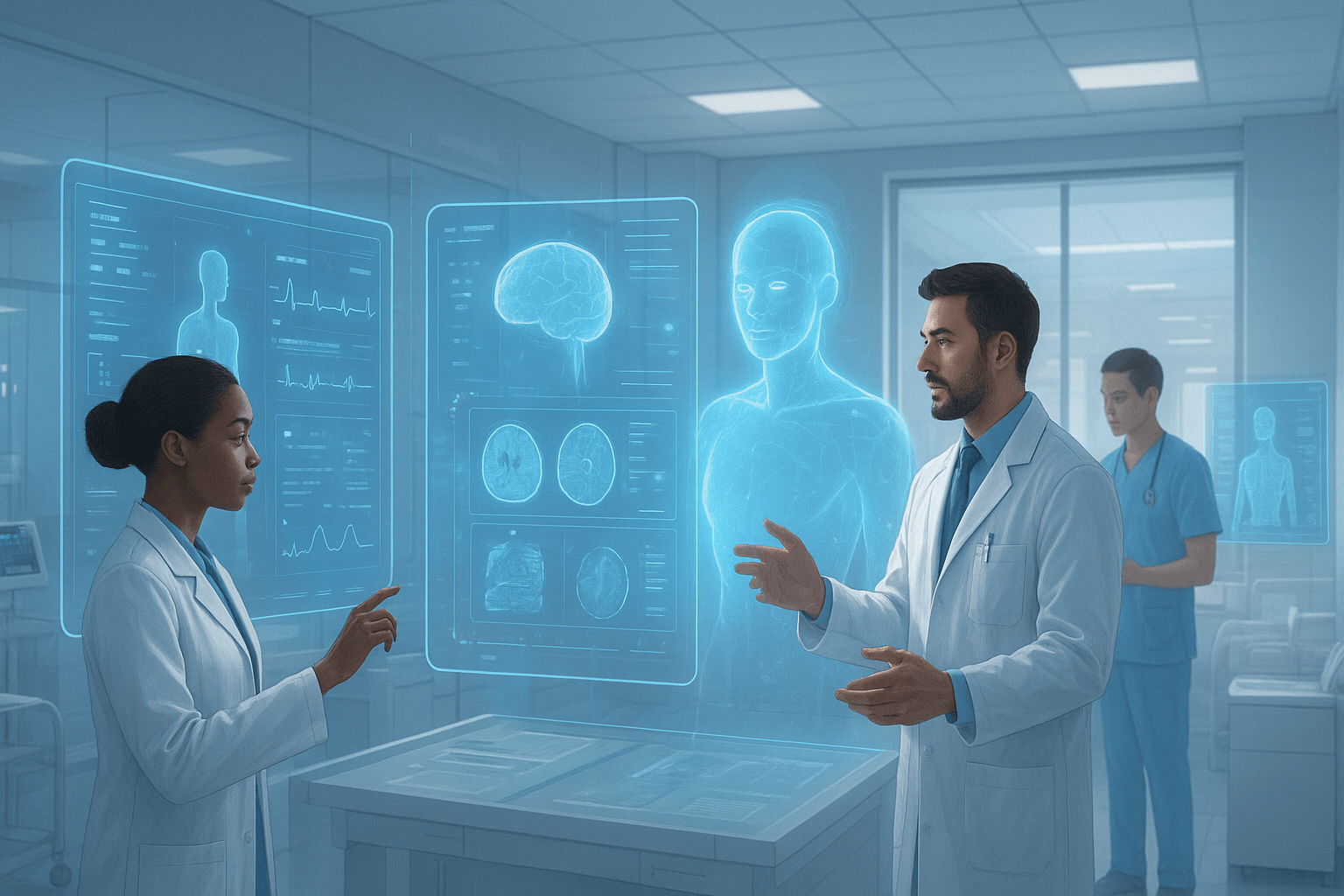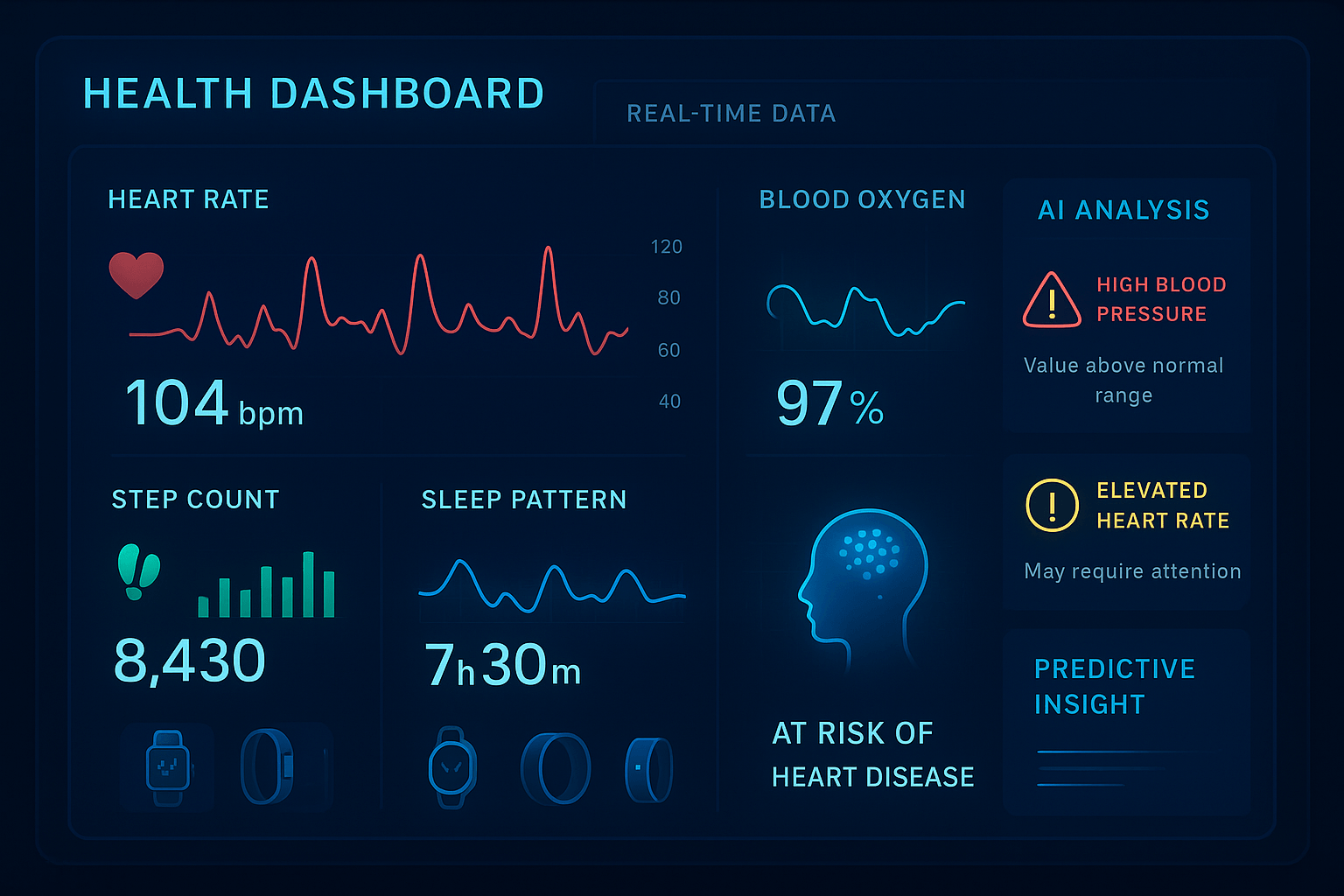How AI is Revolutionizing Healthcare: 5 Breakthrough Applications
The healthcare landscape is undergoing an unprecedented transformation, with artificial intelligence (AI) emerging as a pivotal force. Far from a futuristic concept, AI is now an indispensable tool that is fundamentally reshaping diagnostics, treatment methodologies, and operational efficiencies across the medical sector. This technological evolution promises to redefine patient care and significantly accelerate medical advancements.

5 Breakthrough Applications of AI in Healthcare
AI’s integration into healthcare is yielding remarkable breakthroughs, enhancing capabilities and streamlining processes that were once time-consuming or complex. Here are five key areas where AI is making a profound impact.
1. Enhanced Diagnostics and Medical Imaging
AI is proving exceptionally adept at analyzing vast amounts of medical imaging data, often surpassing human capabilities in both speed and precision. This translates to earlier and more accurate disease detection.
- Oncology Imaging: AI models are specifically tailored for digital pathology in oncology. They process histopathological images to enhance multiple-instance learning, leading to more accurate cancer diagnoses and refined treatment planning.
- Advanced Disease Detection: AI algorithms can swiftly analyze radiological images like X-rays, CT scans, and MRIs. They detect subtle signs of disease that might be imperceptible to the human eye, such as in lung cancer detection where systems have shown higher accuracy than human radiologists Google AI for lung cancer detection. Similarly, AI models have achieved high accuracy in identifying various cancer types and significantly enhancing breast cancer detection.
- Acute Care: AI-driven tools can rapidly analyze CT scans to identify strokes, providing crucial clinical decision support that drastically improves patient care outcomes.
2. Revolutionizing Drug Discovery and Clinical Trials
The traditional process of developing new medications is notoriously lengthy and expensive. AI is significantly streamlining this by accelerating various stages of drug development.
- Accelerated Discovery: AI analyzes massive datasets to suggest novel drug candidates and predict their behavior within the body. This drastically reduces the time and resources needed for initial research phases.
- Optimized Clinical Trials: Datasets aid AI models in predicting crucial trial outcomes, including duration, patient dropout rates, and even mortality. This capability enhances trial design and accelerates the development of new therapies. AI can also optimize patient recruitment by analyzing genetics, health records, and other data to select the most suitable candidates, ensuring trials are more efficient and effective.
3. Personalized Medicine and Treatment Planning
AI is enabling a transformative shift from a “one-size-fits-all” approach to highly personalized patient care. This ensures treatments are tailored to individual needs, maximizing efficacy.
- Individualized Therapies: By analyzing an individual’s genetic makeup, comprehensive medical history, and lifestyle factors, AI can suggest treatments most likely to be effective. This is particularly impactful in areas like cancer treatment, where AI can fine-tune therapies to match a patient’s specific biology, potentially leading to fewer side effects and better outcomes.
- Adaptive Treatment Plans: AI-driven algorithms can continuously adapt and refine treatment plans based on real-time patient data, enabling improved, patient-specific disease management strategies.
4. Predictive Health Analytics and Early Intervention
One of AI’s most powerful applications is its ability to analyze vast amounts of health data to predict potential health issues before symptoms even appear. This capability facilitates proactive and preventative care.
- Real-time Monitoring: Wearable devices equipped with AI can continuously monitor vital signs and alert users about irregular heart rhythms or other anomalies, encouraging early medical intervention.
- Risk Prediction: AI systems can review real-time data from electronic health records, vital signs, and test results to predict high-risk conditions like sepsis in emergency departments, making detection significantly more effective. This proactive approach can lead to timely interventions and potentially reduce hospital readmissions.

5. Optimizing Operational Efficiency and Administrative Tasks
AI is significantly reducing the substantial administrative burden on medical staff, allowing healthcare professionals to dedicate more time and focus to direct patient care.
- Automated Documentation: AI scribes can automatically transcribe patient interactions into electronic health records (EHRs), drastically cutting down the time providers spend on paperwork. Ambient listening solutions, which allow clinicians to focus solely on patients, are gaining traction due to clear returns on investment.
- Patient Flow and Triage: AI triage solutions, integrated with EHR systems, can analyze patient symptoms, medical history, and real-time vitals to identify high-risk patients. This capability helps prioritize care and significantly reduce emergency room wait times.
- Administrative Workflows: AI is transforming administrative processes for both payers and health systems, particularly in areas like claims processing and prior authorizations, boosting efficiency and reducing errors.
- Resource Management: AI is also used to optimize the delivery of essential resources, such as drugs and equipment in short supply, and to efficiently allocate hospital beds. These AI tools are reshaping how healthcare facilities operate.
Recent Developments & Key Statistics
The period between 2023 and 2025 has seen an explosion in AI adoption and breakthroughs within the medical sector, solidifying its role as a foundational technology.
Increased Adoption & Investment
- The past year (2024) witnessed a remarkable surge in AI adoption in medicine, with 66% of physicians using health AI, a significant increase from 38% in 2023. By 2025, nearly half of US healthcare organizations are in early phases of implementing Generative AI.
- A staggering 80% of hospitals now leverage AI to enhance patient care and operational efficiency. Projections suggest that by 2025, 90% of hospitals will utilize AI for early diagnosis and remote monitoring. These advancements align with broader tech trends in 2025.
- The FDA has seen a dramatic increase in applications for AI-enabled tools, with over 340 FDA-approved AI tools now in use, particularly for diagnosing strokes, brain tumors, and breast cancer FDA Artificial Intelligence/Machine Learning (AI/ML)-Enabled Medical Devices.
Market Growth & Economic Impact
- The global market for generative AI in medicine was valued at $609.7 million in 2023 and is projected to surge to an astonishing $23.47 billion by 2033, demonstrating a Compound Annual Growth Rate (CAGR) of 45.4%. The broader AI in healthcare market is expected to reach $21.66 billion by the end of 2025, growing to $110.61 billion by 2030.
- Accenture estimates that AI applications could save the U.S. healthcare economy approximately $150 billion annually by 2026 Accenture – AI in Healthcare. Similarly, a McKinsey report suggests generative AI could improve productivity across the U.S. healthcare system by 10 to 15 percent, potentially translating to $200 billion to $360 billion in annual value McKinsey & Company – Generative AI and the Future of Health Care.
- AI-generated operative reports have shown remarkable accuracy (87.3%), outperforming surgeon-written reports (72.8%), highlighting a 14.5% improvement.
Challenges and Future Considerations
While the potential of AI in healthcare is immense, its widespread integration comes with important challenges. Ensuring the safety, reliability, and fairness of AI systems is paramount. Concerns also exist regarding safeguarding patient privacy and data security, with a significant percentage of healthcare leaders expressing worries about potential biases in AI-generated medical advice and patient privacy. Addressing these issues, alongside interoperability, is crucial for AI’s continued positive impact.
Conclusion
Artificial intelligence is fundamentally reshaping healthcare, moving beyond simple automation to become a cornerstone of modern medical practice. By significantly enhancing diagnostic accuracy, accelerating drug development, enabling highly personalized treatments, predicting health risks, and streamlining operational efficiencies, AI is leading a profound transformation. The rapid pace of innovation, increasing adoption rates, and substantial market growth underscore the pivotal and evolving role of AI in revolutionizing healthcare for a healthier future.